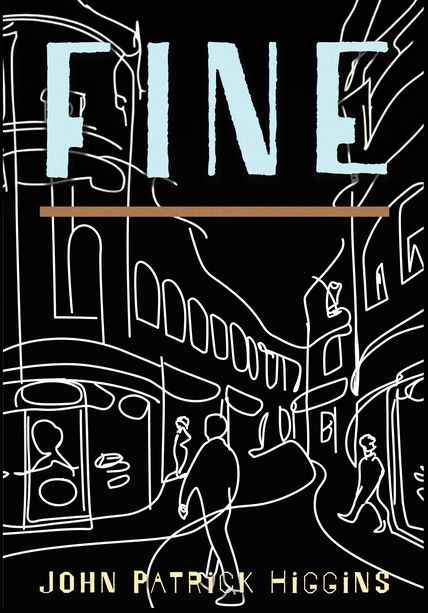
To hear Paul Reverb tell it, he’s fine.
Sure, he’s been caught in a compromising situation by his window cleaner and failed to prevent daylight robbery, and yes, he no longer tells people he was born the day Sergeant Pepper was released, as, to his horror, people no longer know what a Sergeant Pepper is.
Fine.
But Paul isn’t fine. He hates his job and he’s not fond of his friends. He sits in his dead parents’ flat surrounded by his carefully curated, reassuringly warm vinyl, not writing the novel he’s not been writing for a decade. Paul is lonely to his bones and will likely stay that way until his dead body is found by his cleaner.
Will Paul Reverb ever find happiness? Will he even recognise it if he does? And who cares if a middle-aged man finds happiness anyway?
Fine is coarse. Fine is sad and sweet and crude and beautiful. Fine is scurrilously funny while making your bottom lip tremble. Fine is a rallying cry for growing old riotously, for not going gently and for not judging people by the state of their recycling bins.
Notices
“Higgins, a Belfast-based playwright, explores the woes of an isolated and creatively stalled middle-aged man in this witty, tragicomic debut.”
—The New York Times Book Review, Nov 10, 2024
“We can laugh hard at Paul Reverb in each of these stories, asking no more of ourselves than our mockery—an easy ride and a delicious one. But as the tales accumulate and elements of each thread into others, what is this we glimpse? An arc, an evolution—a person. While Higgins may have us struggling to contain one laugh before bursting into the next, he is not merely funny. He subjects us and our culture—high and low—to an endlessly inventive remix, a tombola of giddy and gleeful reference that never neglects the human and never fails to move.”
—Guillermo Stitch, author of Lake of Urine
“Unlike the lives he describes, John Patrick Higgins never disappoints. At the end of every neatly-wrought sentence waits a joke or insight, sometimes both at once. And, at the end of every keen-eyed character study, some sort of epiphany. If you’ve ever wanted a Morrissey song to be longer or his autobiography to be shorter, the prose of John Patrick Higgins is just as hilariously sad and dispiritingly witty. But, unlike Moz, Higgins is at the height of his powers now! Read him before he turns odd! Well, odder.”
—Aislinn Clarke, writer-director of The Devil’s Doorway and Freywaka
"Fine is the debut novel of veteran Belfast-based playwright John Patrick Higgins, an Anglo-Irishman who writes prose with an Irish tang. There’s Beckettian bleakness and Beckettian humanity in Higgins’s portrait of Paul Reverb, a man left behind by the times and increasingly isolated by a stubbornness born from a lifetime’s steady drip of disappointments. But there’s Beckettian humour here too, with perhaps a dash of JP Donleavy– the recurring refrain ‘fine’, that single-syllable sigh of resignation, comes as often as not as the punchline to stories so absurd, and so entirely plausible, that all you can do is laugh. There’s plenty here on the sad spectacle of the failing, ageing male body, and there’s humour and pathos in the vignettes of old friendships disintegrating in the face of new responsibilities or old debaucheries exacting a deadly toll. But there’s also hope, and finally a glimpse of redemption.
“Fine is a fine debut indeed.”
—Patrick Kinkaid, author of The Continuity Girl
“The lives of middle-aged men are to John Patrick Higgins as the statue of Ozymandias was to Shelley: epic, broken, and tragi-comic. Thankfully, Higgins approaches his subject with as much elegance and many more references to 70s British television. This debut novel is so witty and morose it should be set to music by Johnny Marr.”
—Reggie Chamberlain-King, author/editor of The Black Dreams
“John Patrick Higgins is one of most interesting and funny fuckers I’ve ever encountered, and this book is a testament to that.”
—David Holmes, musician and composer
“It’s been a long time since a book has made me laugh this much…. Our main character is Paul Reverb, great name, seems nice enough, a gentle well meaning person and what follows is a series of ridiculous events. Paul is lonely, tragically so it seems at times, nothing seems to go his way, in fact things seem to become sentient enough to make sure they don’t go his way, from buying a coffee, meeting mates in the pub or a nice quiet toss in the privacy of his own lounge, when Paul puts his mind on a task you soon learn to spot the incoming catastrophe…. Absolutely wonderful book, great characters, funniest writing ever and if you ever wanted to get into the head of a horny lonely man then this is the book for you.”
—Jason Denness, in Gnome Appreciation Society
“[A] witty debut novel…. The lines of action are as invisibly elegant and neatly crafted as any one of the writer’s beautiful sentences. Both gut-bruisingly funny and achingly sad. The line between the tragic and the comic is, of course, a fine one.”
—Reggie Chamberlain-King, in Pop Matters
“Higgins is a deft writer whose prose often displays a spare lyricism…. I doubt there’s a page that went by that I didn’t laugh at least once [but] the novel is not without tragedy…. While loneliness, aging, and death are overriding concerns in the novel, Fine also takes on the winner-take-all society Western capitalism has manufactured…. If you go ahead and pick up a copy of Fine, the worst that’s likely to happen is that some sentence, no matter the page, will make you laugh or giggle or chortle. The best? You get the laughs and, after turning the last page, you’ll find yourself just a smidge more reconciled to one day becoming Aunt Sylvia.”
—Vincent Czyz, in The Arts Fuse
